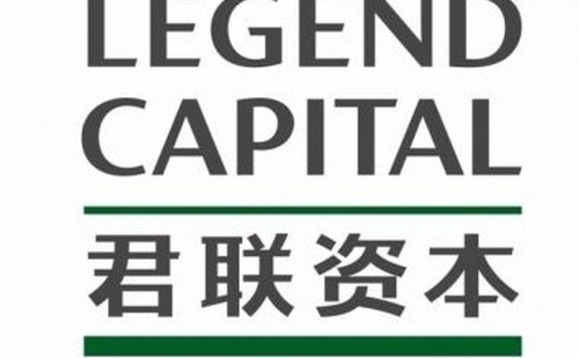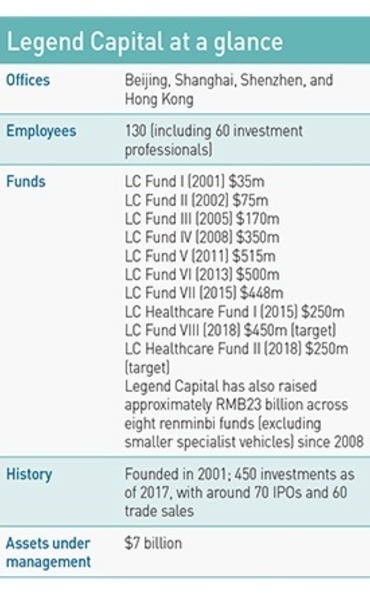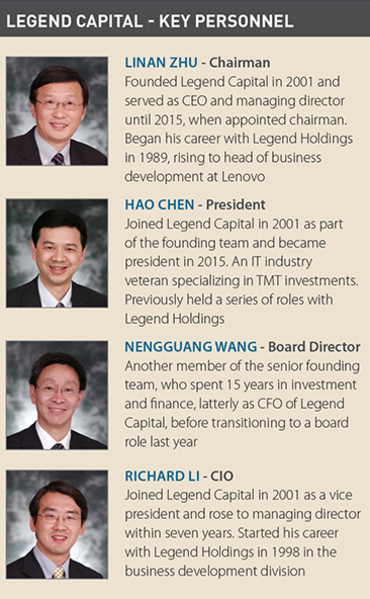
GP profile: Legend Capital

Legend Capital has absorbed lessons from its corporate sponsor to build a diversified investment business across the US dollar and renminbi spaces. It is now trying to take LP relations to a new level
During the two months following its Shenzhen IPO in late January, the market capitalization of Chinese contract research organization (CRO) Pharmaron increased more than fivefold. The stock subsequently flatlined but it remains at roughly the same level, valuing Pharmaron in excess of RMB27 billion ($3.8 billion). It represents a substantial paper gain for Legend Capital – and for the firm's co-investors.
Legend Capital was among Pharmaron's first institutional investors in 2007 and re-upped three times. When the company decided to pursue a domestic IPO, Legend Capital co-led a $280 million funding round in 2015 that took out several other early investors and transitioned the business from an offshore to an onshore structure. LPs from the firm's renminbi-denominated funds contributed capital. The funds and LPs together own more than 20% of the business.
"The pre-IPO period is becoming longer and so the capital requirements for private companies are getting larger," says Richard Li, Legend Capital's CIO. "We have seen some very large funds raised in China in recent years. We want to keep our fund size reasonable, but we want to continue supporting companies round by round. We do that by leveraging co-investment."
While syndicating portions of deals to LPs is already a feature of the firm's growth capital-oriented renminbi business, it has yet to play a meaningful role on the US dollar side, which is strictly early stage – even to the point of sacrificing re-up rights in later rounds. Piau-Voon Wang, who joined Legend Capital earlier this year after a career as an LP with Adams Street Partner, Noah Holdings, and China Development Bank's fund-of-funds team, expects this to change. "We are already seeing plenty of demand," he says.
This is not only a response to evolution in the private markets, but also an effort at more comprehensive engagement with LPs. Legend Capital is currently in the market with its latest US dollar funds, targeting $450 million for its eighth technology, media and telecom (TMT) vehicle and $250 million for its second healthcare vehicle. There is also a partnership with Korea's SK Holdings that involves the formation of a joint venture semiconductor fund – run by a separate team – and a separate account that will make commitments to the TMT and healthcare funds and participate in co-investment.
While the semiconductor fund is a one-off, the separate account option is open to other LPs, industry sources say. The structure allows Legend Capital to make itself relevant to institutional investors whose minimum commitments are too large for individual funds. The pitch is they get to align themselves with a mature, multi-strategy platform; co-investment and even access to direct deals outside of the funds come as part of the package. Legend Capital declined to comment on fundraising plans.
Front to back
This notion of a platform is not recent innovation. Legend Capital operates independently of Legend Holdings – the parent is an LP in the funds and has a minority interest in the GP – but there are deep philosophical ties between the two. These ties were established by the founding team of 30 who were drawn from different business units of Legend Holdings. As a result, the corporate culture of the parent is woven into the DNA of the affiliate.
Legend Holdings was established in 1984 by Chuanzhi Liu and 10 other researchers from the Chinese Academy of Sciences (CAS) who commandeered a porter's lodge as the base for a computing technology division. The company evolved from components supplier into China's leading PC manufacturer, creating the Lenovo brand and listing in Hong Kong. In 2001, Legend spun off Lenovo and repositioned itself as a financial holding company. Legend Capital was formed the same year, with private equity firm Hony Capital and incubator-turned-angel-investor Legend Star following in 2003 and 2008, respectively.
Legend Holdings contributed the entirety of Legend Capital's $35 million debut fund, but the blueprint was always for a fund management firm rather than a corporate venture unit. "We had the front office-middle office-back office structure from day one, as well as an in-house consulting division to support the investment team and participate in post-investment management of portfolio companies," Li explains. "We designed a large platform, but we wanted to grow step by step."

Starting in 2007, the firm addressed the renminbi space as well, recognizing that domestic markets would become an important IPO exit route. The first local currency fund closed at RMB1 billion in 2009; earlier this year, Legend Capital secured RMB7 billion for its fifth flagship renminbi vehicle. The remit has traditionally been wider in terms of sector – healthcare, financial services, education and logistics feature alongside technology – but focused on growth capital rather than early-stage deals.
"Companies looking to go public on the A-share market must have been profitable for at least three years, which is rare among early-stage technology and consumer internet businesses, so the renminbi funds have looked at later-stage opportunities," says Li. "However, more recently, steps have been taken to open up the domestic capital markets to innovative early-stage companies through the launch of the Star Market. As a result, we now allocate 20% for early-stage technology deals."
The firm's experiences in the renminbi space have influenced its approach to later-stage TMT. While other VC firms have sought to fill the gap by raising growth funds that come in when the early-stage vehicles tap out, Legend Capital is uncomfortable with the prospect of entrusting those investment decisions to a single team. Early and growth-stage deals on the renminbi side are the responsibility of different teams. Moreover, syndication is preferable to a growth fund due to a wariness of moving too far too fast, accumulating assets without enough of a track record and supporting infrastructure.
Taking it slowly
This mindset is apparent in Legend Capital's incremental approach to business development. Establishing a platform with teams assigned to each sector and strategy has been a long-term endeavor. There are now 20 investment professionals working on growth-stage deals, another 20 for TMT and 15 for healthcare. Teams in the latter two areas invest out of the US dollar and renminbi funds.
"We started investing in healthcare in 2007 through the fourth US dollar fund. After eight years of preparation we launched our first healthcare funds in 2015, raising $250 million for a US dollar fund and RMB1.6 billion for a renminbi fund," says Jafar Wang. "We are now onto our second funds, and we have invested more than $1.2 billion in the sector, backing over 90 companies and completing 10 IPOs."
There was no healthcare team equipped with backgrounds in medicine when these investments began, so Legend Capital stuck with what it knew. Pharmacy chains were an early area of focus because the firm understood distribution. From there, it expanded into other branches of healthcare services, backing WuXi PharmaTech and Pharmaron, China's two leading CRO players, and KingMed Diagnostics, the country's largest outsourced laboratory testing business. Medical technology and biotech came later, once the firm had accumulated the requisite expertise.
Healthcare was carved out from the TMT strategy in part because the domain knowledge and decision-making processes are different. However, there is still regular collaboration. "When opportunities come in areas like artificial intelligence (AI), which has applications in medical imaging, we have different perspectives and we will assist each other in research," Wang adds. "Just the other day, the TMT fund had to make an investment decision and they asked for our feedback on AI and drug development."
Team building is an exacting process for Legend Capital because it doesn't make lateral senior hires, preferring to develop talent and promote from within – another characteristic that can be linked to the firm's corporate roots. Linan Zhu, who started his career with Legend Holdings in 1989 and rose to become head of business development at Lenovo before establishing Legend Capital, laid the foundations. He is said to have shared part of his carried interest from the first three funds among the wider team, asking in return that they buy into a corporate ethos and culture of collectivism.
To this day, at least 50% of the carried interest from each fund goes to the investment team responsible for deployment, with the rest held by Legend Holdings and the Legend Capital management platform for wider distribution. "When carried interest starts coming through people behave differently, and private equity firms have to design their own culture and way of dealing with it," says P.V. Wang, who was an early backer of Legend Capital during his time with Adams Street Partners. "At this firm, even if you are a top performer, you must share your carry. Legend Capital is trying to avoid superstar culture."
Continuity planning
Prioritizing the team over the individual is at odds with the eat-what-you-kill philosophy espoused by many in private equity, and it may have contributed to high-profile departures from Legend Capital. Kui Zhou was a rising star who left in 2005 and has since fulfilled his potential as a partner with Sequoia Capital China, while Erhai Liu led the consumer technology team before deciding to strike out on his own in 2015 with Joy Capital. More recently, Legend Capital's healthcare heads, Ouyang Xiangyu and Daqing Cai, spun out to form Sherpa Healthcare Partners.
Whether homegrown talent rising through the ranks covers the gaps left by exiting star dealmakers is a matter for LP due diligence. So too is the presence of a sponsor in the GP ownership structure. But one area in which Legend Capital's corporate DNA appears to act unequivocally to its benefit is succession planning. A host of Chinese PE and VC firms are approaching that awkward transition from the first generation to the second, where the skewed division of economics can play havoc with bench strength. Legend Capital has already been through the process once and is well positioned to do so again.
The key is retirement at the age of 60 – not so much mandatory as custom. Zhu served as CEO until 2015 when he was appointed chairman of Legend Capital. CFO Nengguang Wang stepped down last year and now serves as a board member. Jianqing Wang is scheduled to leave her role as head of the in-house consulting firm and become dean of the firm's research institute, which provides CEO training.
"We don't want to be too stagnant or top heavy. Our founders said a new generation should come through every 10-15 years. We recruit, train and mentor young investment professionals and if we set a ceiling, some will leave," says Li, who joined the firm in 2001 as a vice president. "We want to maintain a good age for the senior team, playing an important role in investment for 10 years when they are 40-50. After that, some will leave to start businesses, some will move to the middle and back office, and others will work with the next generation on investments. That is our succession strategy."

Latest News
Asian GPs slow implementation of ESG policies - survey
Asia-based private equity firms are assigning more dedicated resources to environment, social, and governance (ESG) programmes, but policy changes have slowed in the past 12 months, in part due to concerns raised internally and by LPs, according to a...
Singapore fintech start-up LXA gets $10m seed round
New Enterprise Associates (NEA) has led a USD 10m seed round for Singapore’s LXA, a financial technology start-up launched by a former Asia senior executive at The Blackstone Group.
India's InCred announces $60m round, claims unicorn status
Indian non-bank lender InCred Financial Services said it has received INR 5bn (USD 60m) at a valuation of at least USD 1bn from unnamed investors including “a global private equity fund.”
Insight leads $50m round for Australia's Roller
Insight Partners has led a USD 50m round for Australia’s Roller, a venue management software provider specializing in family fun parks.








